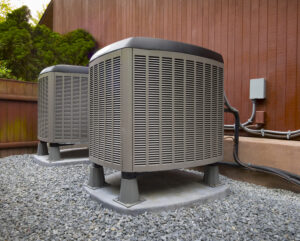Things to Consider Before Replacing Your HVAC Unit

As a homeowner, replacing your HVAC unit is a significant decision that can impact your comfort and energy bills for years to come. While it can be tempting to stick with your current unit as long as possible to save money, an outdated or inefficient HVAC system can end up costing you more in the long run.
Before replacing your unit, there are several things to consider, such as the age of your current system, the size and layout of your home, and your budget. By understanding these factors and working with a qualified HVAC professional, you can make an informed decision that ensures your home is comfortable and energy efficient while fitting within your budget.
Signs HVAC System Replacement is Needed
First thing’s first – what are some common signs to look out for signaling your HVAC unit is in need of a replacement? Of course, not all situations will be the same, but generally homeowners should consider replacement if the following signs occur:
1. Inadequate heating or cooling
If your HVAC system is struggling to maintain a comfortable temperature, it may be a sign of a malfunctioning unit.
2. Poor airflow
Weak or inconsistent airflow from your vents could indicate a clogged or damaged ductwork, a failing blower motor, or a dirty air filter.
3. Unusual noises
Strange noises such as rattling, buzzing or grinding coming from your HVAC unit could indicate loose or damaged components.
4. Strange odors
Foul or musty smells coming from your HVAC unit could be a sign of mold or mildew growth or a gas leak, which requires immediate attention from a professional.
5. High energy bills
If you notice a significant increase in your energy bills, it could be a sign of an inefficient HVAC system, which requires maintenance or replacement.
If you notice any of these signs, it’s crucial to schedule a professional inspection and repair to prevent further damage.
Factors to Consider Before HVAC Unit Replacement
1. Age of the current unit
The age of your HVAC unit is one of the most critical factors to consider. If your current unit is older than 10-15 years, it may be time to replace it.
2. Energy efficiency
HVAC units have energy efficiency ratings that indicate how much energy they consume to heat or cool your home. A higher-rated unit can save you a significant amount on your energy bills overtime.
3. Size of the unit
The size unit you need depends on the size of your home, your climate, and your insulation. A unit that is too small or large for your home will not work efficiently and could lead to costly repairs down the line.
4. Type of HVAC Unit
There are several types of units available including central air conditioning, heat pumps, and ductless mini-splits. Each has its own advantages and disadvantages.
5. Cost
HVAC units can be a significant expense, so it’s essential to consider the upfront cost, as well as the long-term costs, such as maintenance and energy bills. It’s also important to consider financing options or rebates that might be available.
6. Contractor
Choose a reputable contractor with experience and a good reputation. If your HVAC unit requires frequent repairs and maintenance, it may be more cost-effective to replace it. Don’t miss tips and tricks for finding the right contractor as you begin your search process.
7. Additional features
Consider any additional features or upgrades that you may want, such as a programmable thermostat or air filtration system. Newer HVAC systems will come equipped with all the bells and whistles, leading to better and more convenient comfort within your home.
8. Expired Warranty
Investing in a warranty for your HVAC system can shield you from potential hefty costs that come with repairs. Most units come with a limited warranty. For the warranty to remain valid, it’s important to follow all terms and conditions listed in the contract. If your system isn’t working properly and your warranty is expired, it might be worth completely replacing.
Before deciding to replace your HVAC unit, take the time to consider all of the factors that come into play – from budget and individual needs to recommendations from a qualified professional. Doing so will ensure you make an informed decision based on what fits best for your unique situation.
FAQ
1. How long does it take to replace and HVAC system?
Typically, installing a new HVAC system will take between three to five days.
2. What is the most expensive part of an HVAC unit?
The air compressor is the most expensive part to replace. Exact cost will depend on the compressor size, type of compressor, brand, and installation costs.
3. Does replacing the HVAC system increase home value?
Although several factors need to be taken in to consideration, generally yes, a new HVAC system can increase your home’s value by up to 10%.

Anna has over six years of experience in the home services and journalism industries and serves as the Content Manager at MyHomePros.com, specializing in making complex home improvement topics like HVAC, roofing, and plumbing accessible to all. With a bachelor’s degree in journalism from Auburn University, she excels in crafting localized, comprehensive guides that cater to homeowners’ unique needs. Living on both coasts of the United States has equipped her with a distinctive perspective, fueling her passion for turning any house into a cherished home through informed, personalized decision-making.
